Blog
5 Ways to Tell If You Have Gum Disease

Gum disease, also known as periodontal disease, can cause the gums to become inflamed and infected. This condition can be both painful and embarrassing, but many people don’t realize they have it until the symptoms are severe. To make matters worse, gum disease that has progressed can’t be cured, only treated. One of the best ways to catch gum disease early is to pay attention to the top five signs of gum disease, and if you do experience symptoms, see your dentist in Douglasville quickly.
- Bleeding Gums
When you floss or brush your teeth, do you often see blood on your toothbrush? Believe it or not, bleeding while you brush or floss can actually be an early sign of gum disease. If left untreated, bacteria can spread through your gums to affect the bone structure in your jaw. A good rule of thumb: if you see blood, bring it up with your dentist in Douglasville right away. Early treatment can help get things under control before it’s too late.
- Swollen Gums
Gingivitis is a common form of gum disease that most often manifests as swollen, red gums. This is most often an indication that plaque has accumulated on your teeth and has begun to calcify. Your dentist may be able to treat you with a deep cleaning or antibiotic treatment if they suspect you have gingivitis. However, if you ignore your symptoms for too long, it could lead to periodontitis, which can lead to tooth loss and infection in other parts of your body.
- Painful Gums
It’s possible to have gum disease and never experience any pain, but severe cases of gum disease typically cause soreness. If you notice that your gums are sensitive or painful to touch after flossing or brushing, you might be suffering from plaque buildup. However, it’s important to note that if you can explain the cause of the pain, such as a piece of food lodged in your gums, there may be no cause for concern.
- Sensitive Gums
If your teeth are sensitive to hot or cold foods, it could simply be a sign of sensitive teeth. However, it can also be a sign of gum disease. When gum disease happens, it causes gums to become inflamed. This can cause teeth to protrude outwards, leading to sensitivity to heat or cold. Make sure to talk with your dentist in Douglasville about any tooth or gum sensitivity you have at every visit.
- Bad Breath
Bad breath that lasts for longer than two weeks can be a sign of gum disease. If you don’t floss and brush your teeth well daily, food bits can remain in your mouth. These foods will feed mouth bacteria and cause bad breath and a buildup of plaque. This plaque can irritate your gums and allow gum disease to take hold. Usually, bad breath is one of a few signs of gum disease.
Gum disease is a serious condition that can have long-term health consequences. If you have any of these symptoms, don’t wait to see a dentist in Douglasville. Early detection and treatment are essential for preventing more serious problems later on.
How to Get Whiter Teeth in 4 Easy Steps

Over time, your teeth can develop stains and discoloration that diminish their shine and luster. Luckily, you don’t have to live with less than a dazzling smile. In fact, you can whiten your teeth and restore their natural beauty in just four easy steps! Let your dentist in Douglasville teach you how.
- Brush & Floss
Brushing your teeth is not only good for your oral health but also good for preventing staining. Ideally, you should brush your teeth after every meal; however, twice a day is a good place to start. In addition to brushing after every meal and snack, try getting into habits like rinsing and spitting after you eat — it’ll help clear food from between your teeth and prevent bacteria from being left behind that could lead to staining. But you can’t forget about the floss. Flossing is just as important as brushing when it comes to both maintaining a healthy mouth and a white smile. Flossing helps remove plaque from between teeth, preventing discoloration.
- Avoid Tobacco
When you smoke or chew tobacco (or anything else containing nicotine), it stains your teeth and gums. Pair the nicotine with tar and you have a double whammy. Even small amounts of tar build up over time, making your teeth appear yellowed and stained. Avoiding tobacco can help keep your teeth stain-free and bright and white.
- Smile Whitening Treatments
There are two main types of smile whitening treatments — over-the-counter products and professional in-office whitening. There are pros and cons to each.
- Whitening strips are affordable, easy to use, and available at nearly every drugstore. However, it often takes longer to see results and the results can be short-lived. Additionally, the whitening gel can easily come in contact with the gums and cause irritation.
- Professional teeth whitening requires an appointment but is done by a dental professional who can ensure each and every tooth is getting treated and that your gums aren’t exposed to the whitening ingredients.
The downside of either whitening treatment? They may leave your teeth feeling a bit sensitive for a few days following treatment. Determining the right option for you requires a chat with your dentist in Douglasville.
- Cosmetic Dentistry
When tooth stains are more than surface stains, they can be very difficult to impossible to remove through brushing and traditional whitening treatments alone. Luckily, there are cosmetic dentistry options, such as veneers, that can help. Veneers can take years off your appearance by covering unsightly stains and imperfections like gaps or spaces between teeth. They’re custom-created to be the perfect size, shape, and color for an enhanced, yet natural, appearance.
If you’re looking for a professional way to get whiter teeth, start with the basics. If you’re not seeing the results you want, cosmetic dental solutions are available that can make a difference in just one or two office visits. For more information about how you can get whiter teeth, schedule an appointment with your dentist in Douglasville today!
How to Freshen Your Breath for National Fresh Breath Day

National Fresh Breath Day is celebrated on August 6th this year, and if you’re feeling like your breath could use some freshening, you’re not alone. In fact, wondering how to freshen breath is one of the most common questions your dentist in Douglasville is asked. So whether you’re preparing for an important business meeting or getting ready for a date, having fresh breath will leave you feeling confident and ready to take on the day ahead of you. Follow these tips to have your breath smelling great in no time at all!
Brush & Floss
You’ve heard us say it before and you’ll hear us say it again — brushing and flossing your teeth daily is the best way to keep dental problems at bay, including bad breath. Make sure you’re brushing your teeth at least every morning and before bed every night. If you can, try to brush after meals, too. When it comes to flossing, we recommend flossing at least once a day with traditional floss or a water flosser. Also, don’t forget to clean your tongue! Tons of bacteria linger on the bumpy surface, so it’s important to gently brush your tongue every time you brush your teeth.
Avoid Dry Mouth
Dry mouth is one of the leading causes of bad breath, so to combat bad breath you need to first combat dry mouth. Dry mouth can be caused by numerous things such as alcohol, soft drinks, tobacco, and certain medications. Of course, we never recommend stopping any medications without first speaking to your physician. We do recommend drinking plenty of water throughout the day to help keep your mouth hydrated.
Eat Your Vegetables
Eating a well-balanced diet packed with fresh vegetables isn’t just good for your body, it’s also good for your teeth and gums. Crunchy veggies help gently scrub away bacteria and can even help hydrate your mouth. Also, green leafy vegetables such as chard, kale, collard, mustard, spinach, and alfalfa are loaded with chlorophyll, which happens to be a natural deodorizer.
See Your Dental Hygienist
We all know that your dentist in Douglasville recommends visiting at least twice a year, or more often for those who have a history of gum disease or other oral health problems. But did you know that checkups and cleanings with your hygienist can also help keep your breath fresh? Getting professional cleanings regularly will help remove both bacteria and sticky plaque that’s impossible to remove at home — both of which can contribute to bad breath.
If you really want fresh breath on National Fresh Breath Day — and every day of your life — see your dentist in Douglasville today. Dentists are experts at diagnosing underlying problems like gum disease and tooth decay, so they can give you targeted solutions for keeping your mouth healthy and fresh-smelling.
4 Oral Health Dangers of Vaping

In recent years, vaping or e-cigarettes have become increasingly popular, particularly among young adults and even teens. They’re often seen as a ‘healthier’ version of smoking cigarettes. But as more studies come out, we’re finding out more and more ways vaping can be detrimental to overall health. The concerns don’t end there. There are also oral health side effects of vaping that your dentist in Douglasville wants you to be aware of.
Vaping and Oral Health
Vaping bypasses traditional means of smoking by eliminating the tobacco and substituting it for flavored or unflavored liquid. But that doesn’t mean they’re without dangerous ingredients that harm both oral and overall health.
1. Propylene Glycol
Propylene glycol is one of the most common ingredients in vaping liquid, and it’s also one of the things that concerns your dentist in Douglasville. This liquid, when broken down in the mouth, creates various byproducts that are all toxic to tooth enamel and the soft tissues in the mouth. Essentially, it can wear down enamel, weaken teeth, and leave them at risk for decay. That’s not all. Propylene glycol also dries out the mouth and limits saliva production. When this happens, some side effects may include dry mouth, bad breath, and an increased risk for gum disease and cavities.
2. Vegetable Glycerin
Another dangerous liquid found in e-cigarettes is vegetable glycerin, which gives e-liquid a sweet flavor. Vegetable glycerin is found in some foods we eat and acts as a sweetener there too. One thing about this product that pleases your dentist in Douglasville is that it’s not believed to cause cavities. But, when vegetable glycerin is mixed with flavoring, which many e-liquids do, the results are a bit scary. According to one study, flavored e-liquids contributed to a 27% decrease in enamel hardness. That, paired with the fact that the thickness of the liquid in the mouth makes more bad bacteria stick to teeth and teeth crevices, can result in decay.
3. Nicotine
Just as with traditional cigarettes, e-cigarettes are addictive thanks to the nicotine content. Nicotine itself brings a whole host of oral health concerns, one being the effect it has on gum tissue. Studies show nicotine can restrict blood flow to the gums and affect immune cell functions, all of which can put someone in danger of developing gum disease.
4. Batteries
Even though e-cigarettes don’t require a flame to use, they can still be dangerous. The lithium batteries that power vape pens have a tendency to overheat, and there have been reports of pens exploding. These explosions can cause serious injuries to the mouth and face, and while rare, can even result in fatal damage.
Many people use vaping as a way to stop smoking traditional tobacco products as it’s often seen as a better alternative. However, vaping doesn’t come with its risks. Besides the oral health side effects listed, vaping has been linked to:
- Pneumonia
- Rapid heart rate
- Congestive heart failure
- Stroke
It’s never too late to quit smoking traditional cigarettes or e-cigarettes. The American Lung Association has some great advice and is a good place to start.
Why It’s Important To Brush Your Teeth At Night
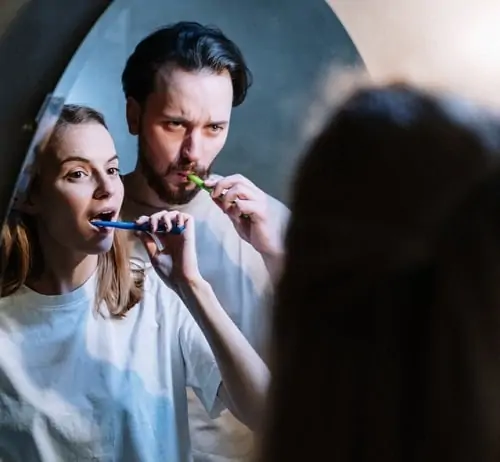
After a long day, you may consider skipping your nightly brushing routine and heading straight to bed instead. However, brushing your teeth every morning and every night is crucial to maintaining good oral health and protecting your teeth against decay, cavities, and other oral health problems. No matter how tired you may be, trust your dentist in Douglasville and take two minutes to clean your pearly whites.
The Problem With Acid
Our mouths naturally produce acid constantly throughout the day and night. But thankfully, we have a built-in defense against acid — saliva. Saliva neutralizes these acids and rinses them away before they have a chance to wear down the protective layer of tooth enamel. Saliva production is more active during the day and is working overtime to destroy acid. But at night, saliva production slows down and can’t protect teeth against acid as well. However, brushing your teeth at night with fluoride toothpaste can create a layer of protection against these acids.
Food Debris
Ideally, we eat at least three meals a day, and sometimes we snack in between meals. That means there are a lot of chances for food debris to get left behind at the end of the day. If they’re left alone, bacteria will feed on the food, which increases the chance of decay. Brushing your teeth at night can help remove food particles, stave off bacteria, and protect your teeth as you sleep.
Protection Against Plaque
Plaque is the yellowish sticky stuff that adheres to the teeth. Regularly brushing and flossing can remove plaque and limit its ability to build up over time. When plaque isn’t removed, it can lead to tooth decay, cavities, and even gum disease. In fact, plaque build up is often the main cause of dental problems. Removing it each night can keep you from needing to see your dentist in Douglasville for treatment.
Morning or Night: Which is More Important?
Even though your dentist in Douglasville will always recommend that you brush your teeth twice a day, once in the morning and once a night, if you absolutely need to choose between the two, brushing at night is actually slightly more beneficial. Sticking to a regular brushing habit at bedtime removes food, acid, and bacteria that have built up throughout the day, protecting your teeth from cavities.
Before you lay your head down on your pillow to sleep, make sure you take some time to brush your teeth properly. Choose a soft-bristled toothbrush, angle it at 45-degrees, and gently scrub each section of your mouth in tiny circular motions. It’s also important that you floss in between each and every tooth to remove any plaque, bacteria, or food debris that may be hiding.
Besides brushing your teeth every night (and ideally every morning!), make sure you maintain regular appointments with your dentist in Douglasville. These checkups can remove any plaque that may have hardened into tartar and protect your teeth from oral health problems.
What Does It Feel Like When A Filling Falls Out?
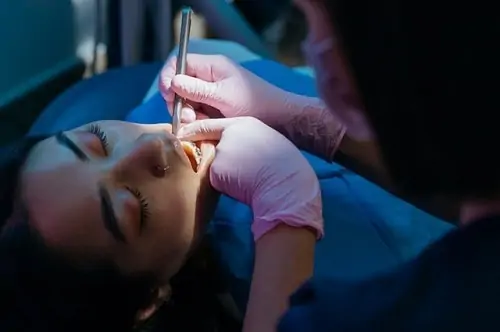
More than 91% of the American adult population has had at least one cavity, and the most common treatment for a cavity is a super-strong dental restoration called a filling. However, no matter how tough a filling is, it can still come loose and fall out. But how do you know if you lost a filling and need to see a dentist in Douglasville?
Pain & Sensitivity
While numerous things can contribute to tooth pain and sensitivity, one of the most common explanations for this type of discomfort is a lost filling. Hot or cold foods and drinks that cause zings of pain through your tooth could indicate that the protection of a filling is no longer there. If you’re ever experiencing tooth pain or hot-cold sensitivity, it usually means something isn’t right and that you should see your dentist as soon as possible.
Feeling a Hole
Sometimes fillings fall out and you don’t even know it. This usually happens while eating, and you may not experience any pain but your tongue feels a sharp hole or indentation in your tooth. This is a key indicator that your filling is no longer there and that you need a replacement.
Biting a Hard Crunch
As we’ve mentioned, losing a filling while eating is pretty common. If a filling falls out while you’re chewing you can actually bite down on it and feel a hard crunch. Now, tiny crunches happen while eating all sorts of food, so don’t panic. See if you can feel around for any holes. If you do, call your dentist in Douglasville.
Food Gets Stuck
Food particles will always get stuck in between teeth and in the tiny crevices. But if you’re noticing a large amount of food buildup in an area that had a filling, you may have lost a filling without knowing it.
Reduce Your Risk
Dental fillings are constructed of tough materials, but they aren’t invincible. They can weaken over time naturally or because of a bad bite, clenching, or grinding. However, many fillings fail due to the foods we eat. Chewy, sticky foods as well as hard, crunchy snacks such as popcorn and pretzels are some of the most common causes of loose or lost fillings. To reduce your risk of losing a filling, enjoy these types of foods in moderation, take good care of your teeth by brushing and flossing regularly, and wear your night guard if you’re prone to clenching or grinding while you sleep.
If you think one of your fillings fell out, it’s crucial to schedule an appointment with your dentist in Douglasville as soon as possible. Early treatment can help save your tooth and prevent other problems from occurring.
Are Sports Drinks Bad For Teeth?
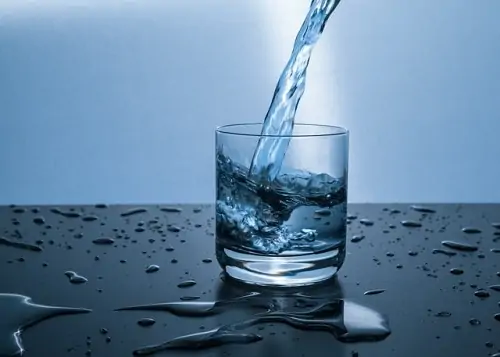
Sports drinks are the beverage of choice for many after exercise or spending a long day in the hot weather. While these electrolyte-packed drinks can help replenish the body with minerals lost through sweat, they can also be bad for teeth. Join your dentist in Douglasville as we take a look at how these beverages can cause irreversible damage to your teeth.
This Time, It’s Not The Sugar
Some people choose to drink sports beverages in place of soda because they don’t contain as much sugar. Now, while it’s still very true that sugar can contribute to oral health problems, this time, we’re more concerned with the acid found in many sports drinks.
Acidic foods and drinks damage tooth enamel, and once enamel is gone… it’s gone. This is concerning for your dentist in Douglasville. Tooth enamel serves as a layer of protection against bacteria, and without it, bacteria have full reign over your teeth. These bacteria will work their way into tiny crevices and feed on leftover food particles and sugars. They will then release acid as part of their digestion process. And the cycle repeats. More acid means more risk for enamel loss and more risk for dental problems.
Cavities & More
Acid and bacteria are a recipe for decay and cavities. When a cavity is new, it’s usually easy to treat with a dental filling. However, if the decay is not treated by your dentist in Douglasville, it will continue to eat away at the tooth. Deeper areas of decay may require a root canal and perhaps a dental crown to stop the progression and save your tooth. But if not treated, an infection can develop, or the tooth may need to be extracted.
Signs of a Cavity
Early treatment is the best way to protect your tooth and stop decay. If you notice any signs of a cavity, see your dentist in Douglasville promptly. Signs include:
- Sensitivity to heat, cold, or sweets
- Discoloration
- Toothaches
- Pain when biting
- Holes or pits on the tooth surface
The next time you’re looking to quench your thirst, we always recommend choosing water. However, if you need that extra level of hydration and electrolytes, try drinking your sports drink with a straw. This will help limit the amount of acid that comes in contact with your teeth.
As always, brushing and flossing your teeth every day and seeing your dentist twice a year will also help protect your teeth and overall oral health.
Why Are My Teeth Discolored?

Discolored teeth are incredibly common, and your dentist in Douglasville talks to patients every day who are looking to improve the appearance of their teeth. While a less than dazzling smile can certainly hurt your self-confidence, is there a chance that tooth discoloration could also mean something more serious is going on?
Causes
There are numerous things that can contribute to tooth discoloration. Some are outside of our control, but there are also things we can control. And when we limit or remove those things from our lives, it can work wonders in transforming the color of our teeth. Let’s take a look at some of the most common causes of discoloration.
- Foods & Drinks
Some of our favorite foods and drinks may be delicious to eat but leave stains behind on our teeth. Coffee, tea, red wine, and even pasta sauce can cause teeth to darken over time. To limit the effects, enjoy these staining foods in moderation or rinse your mouth with water after eating them.
- Tooth Decay
One of the main reasons we brush and floss our teeth regularly is to remove bacteria and plaque buildup. If we don’t, they’re left behind and can easily cause damage. Bacteria in the mouth naturally release acid, and this acid can weaken enamel and increase the risk of decay. When the tooth enamel decays, the yellow innards of the teeth become more visible and make teeth appear dark. If the decay progresses it will lead to a cavity that can also be dark in color and require treatment from your dentist in Douglasville.
- Aging
There are a lot of great things about getting older. Tooth discoloration isn’t one of them. As we age, that protective enamel can become thin and once again show more of the yellowish layers underneath.
- Nicotine
Nicotine products, including cigarettes, cigars, and chewing tobacco, contain staining agents that, over time, will stick to the teeth and become very difficult (if not impossible) to remove.
- Old Dental Work
Thanks to advancements in technology, many of the old ways of doing dentistry have progressed. This includes things like fillings, crowns, and bridges. A lot of time, dental restorations can be made with white materials instead of metal that can quickly darken a smile. Talk with your dentist in Douglasville about any old dental work and ask about any new work to see if tooth-colored restorations are appropriate for you.
Treatment
The best way to whiten your teeth depends on the cause, and not all treatments will work for each situation. This is why it’s important to meet with your dentist in Douglasville before beginning any tooth-whitening treatment, including over-the-counter whitening products. Some forms of cosmetic dentistry that can improve the color of teeth, include:
- In-office professional smile whitening
- Dental bonding
- Crowns
- Veneers
You don’t have to live with a dull or discolored smile. Your dentist can help. Call to schedule an appointment today.
Can Allergies Make Your Teeth Hurt?
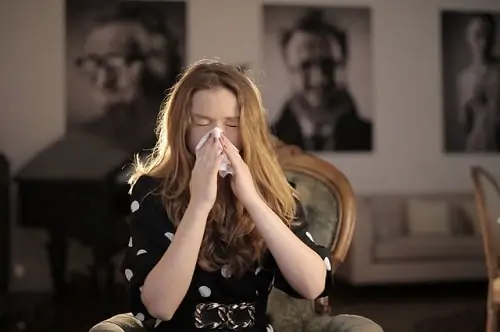
The season of spring is officially upon us. But that’s not the only season affecting us nowadays. It’s also allergy season. For many people, allergy season can be brutally annoying. The stuffy nose, the itchy eyes and throat, and the sneezing can make it hard to breathe. But did you know that allergies may also contribute to tooth pain and other dental problems? Let’s take a look at what your dentist in Douglasville has to say about allergies and your oral health.
Congestion & Tooth Pain
Saying that allergies cause tooth pain can seem like a stretch, but your dentist in Douglasville knows just how true it can be. When you’re congested, such as when your allergies are in full bloom, your maxillary sinuses are packed with pressure. This can make your head or face feel full like a balloon. Your back molars may also experience some pain. Why does that happen? Well, since the roots and nerves of those back teeth are so close to the maxillary sinuses, sinus inflammation can put pressure on the nerves and cause discomfort. Unfortunately, dental concerns with allergies don’t end there.
Stuffy Nose & Oral Health
The traditional side effects of allergies are annoying enough, but some secondary symptoms concern your dentist in Douglasville. One of the hallmarks of an allergy flare is a stuffy, drippy nose. A stuffy nose happens when there’s too much mucus production. While mucus is normal, too much of it can block up the nasal airways and make it hard to breathe out of the nose. As a result, allergy sufferers will start to breathe out of their mouths. Now, while this doesn’t seem like a big deal, chronic mouth breathing can contribute to some serious dental problems.
Mouth Breathing & Dental Problems
We understand that you need to breathe, so if your nose is stuffed up and you need to breathe out of your mouth, that’s ok. But long-term mouth breathing can cause long-term problems. Mouth breathing tends to dry out salivary glands and leave the mouth feeling as dry as a desert, also appropriately known as dry mouth. Dry mouth is uncomfortable, but it can also put someone at risk for cavities, bad breath, and gum disease. You see, saliva is responsible for rinsing away bad breath and cavity-causing bacteria. Without it, these bacteria are left behind to attack tooth enamel. Bacteria are the main contributors to bad breath, cavity development, and gum disease.
Treat Your Allergies, Save Your Smile
During allergy season, it’s important to treat symptoms as best as you can to avoid discomfort and protect your teeth from pain and the effects of mouth breathing. Find a medication that works for you and stick to it. You should also talk with your dentist in Douglasville about seasonal allergies or other allergies.
Can Acid Reflux Make Your Teeth Hurt?
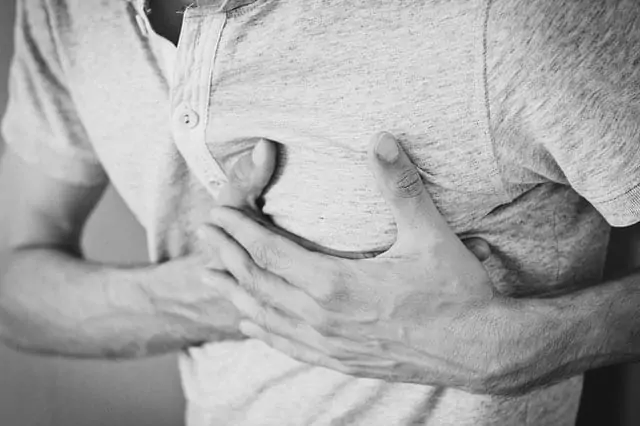
Almost all of us are familiar with the discomfort and pain associated with acid reflux, also known as GERD, or commonly described as indigestion or heartburn. But can something that originates in the stomach and affects digestion also make your teeth hurt? Your dentist in Douglasville is here to tell you that yes, acid reflux can make your teeth hurt and can even cause irreversible damage to your pearly whites.
Acid Reflux & Dental Health
Acid reflux, GER, GERD, heartburn, and indigestion are all similar in symptoms and are often used interchangeably to describe the same thing. Let’s get on the same page and refer to it as one thing in this blog — acid reflux. Acid reflux occurs when the stomach acids responsible for breaking down foods work their way up into the esophagus. The result is a burning, often painful sensation in the chest. But it can also affect the teeth.
Acid is one of the most concerning things for your dentist in Douglasville. It can easily wear away at that super-strong protective layer of tooth enamel and leave teeth at increased risk of decay and cavities. If not caught early, the damage caused by acid reflux may be irreversible or difficult to treat. However, when your dentist identifies the damage early, your teeth may be treated with fillings, a crown, or bonding.
Signs of Acid Reflux
Many people can experience acid reflux differently, but some of the most common signs include:
- Heartburn
- Bad breath
- Acidic taste in the mouth
- Difficulty swallowing
- Tooth sensitivity
It’s important to note that dental damage caused by acid reflux may not be noticeable, especially in the early stages. This is yet another reason why it’s so important to see your dentist in Douglasville regularly.
How to Protect Your Teeth
If you have acid reflux, you may be thinking that it’s only a matter of time before the acid gets the best of your teeth. But that’s not necessarily true. There are many medications available that can help reduce how often you experience symptoms of acid reflux. A gastroenterologist can help you find the best one for you. Outside of medication, your dentist may recommend some other things you can do to protect your teeth against stomach acid, such as:
- Avoiding acidic foods and drinks
- Limiting spicy or sour foods
- Chewing sugar-free gum
- Brushing and flossing every day
- Swishing your mouth with water after eating
- Drinking plenty of water throughout the day
- Waiting an hour to brush your teeth after you eat or drink something acidic
As with many dental problems, early detection is key. Make sure you visit your dentist twice a year for checkups and cleanings so any potential problems can be treated early, when success is more likely, and when long-term damage is minimized.
